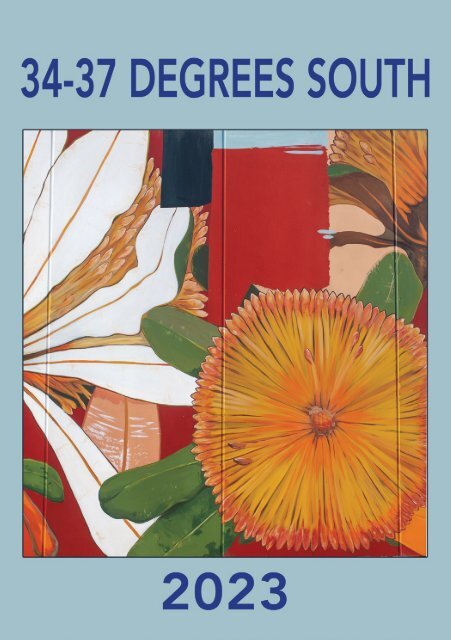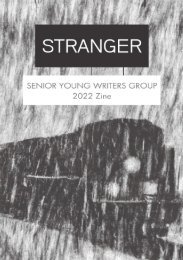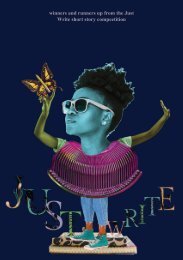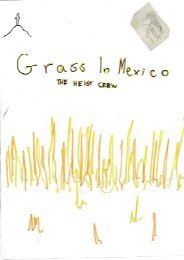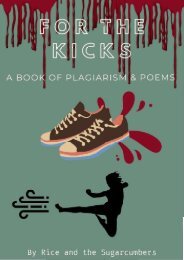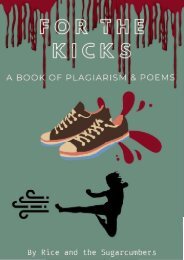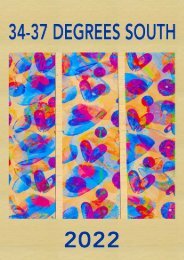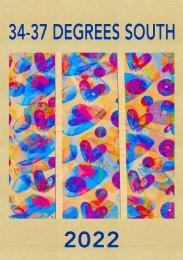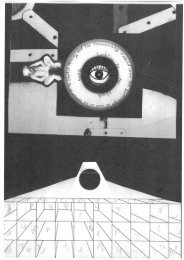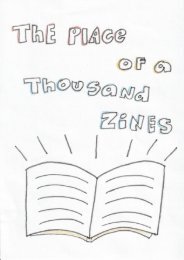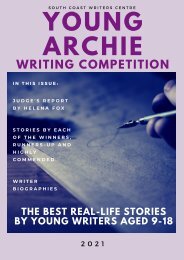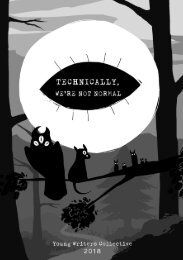34-37 Degrees South - 2023
This anthology from the South Coast Writers Centre presents fresh country poetry from emerging and award-winning local writers.
This anthology from the South Coast Writers Centre presents fresh country poetry from emerging and award-winning local writers.
You also want an ePaper? Increase the reach of your titles
YUMPU automatically turns print PDFs into web optimized ePapers that Google loves.
<strong>34</strong>-<strong>37</strong> DEGREES SOUTH<br />
COUNTRY<br />
<strong>2023</strong><br />
An Anthology of Poetry<br />
from the <strong>South</strong> Coast Writers Centre Membership
Published <strong>2023</strong> by <strong>South</strong> Coast Writers Centre, southcoastwriters.org<br />
Copyright © <strong>2023</strong>. All rights reserved. Copyright of individual poems<br />
is retained by the authors.<br />
Cover image: Ash Taylor, Mural Port Kembla 2022 (detail). Part<br />
of the Wonderwalls Project Port Kembla 2022 commissioned by<br />
Wollongong City Council as part of its public art program. The<br />
mural is located on the corner of Wentworth Street and Church Street<br />
Port Kembla. Ash Taylor is a muralist and multi-disciplinary artist<br />
captivated and inspired by the beauty found in Australian landscapes<br />
and our natural environment. http://ashtaylr.com<br />
ISBN: 978-0-9803987-7-9<br />
Photo credits. All photos Peter Frankis except p.1, David Clode<br />
https://unsplash.com/@davidclode<br />
Typesetting: Peter Frankis<br />
Printed: Print Media, Wollongong<br />
ii
Acknowledgement of Country<br />
This publication was produced on unceded Wadi Wadi land and<br />
the poems were written by poets living and working on the unceded<br />
lands of Aboriginal people throughout the <strong>South</strong> Coast, Illawarra and<br />
<strong>South</strong>ern Highlands of NSW and wider parts of Australia. On behalf<br />
of the poets in this edition, the editors acknowledge and pay respect<br />
to the Traditional Custodians and Elders of these lands, our nation’s<br />
first storytellers and poets, and their continued spiritual and cultural<br />
connection to, and custodianship of, Country.<br />
iii
Foreword<br />
Based at Coledale, near Wollongong, the <strong>South</strong> Coast Writers Centre<br />
serves writers and the public between Helensburg and Eden and west<br />
into the <strong>South</strong>ern Highlands (approximately <strong>34</strong> to <strong>37</strong> degrees <strong>South</strong><br />
latitude).<br />
This is the second anthology from poets in the SCWC membership,<br />
focused this year on the theme of Country with poems ranging from<br />
haiku and tanka, through sonnets and free verse to prose poetry.<br />
In this lively collection, I’m pleased to see some of our well-published<br />
poets such as Tim Heffernan, Dr Elanna Herbert and Erin Shiel. Joining<br />
them are newer writers to give the reader a sense of the variety and<br />
diversity of writers working today. The anthology also features a piece<br />
from Ms Fatima Sayed, a Syrian-Australian who we invited to write<br />
about her refugee experience.<br />
Sadly, <strong>2023</strong> saw the passing of Ron Pretty AM, after a long illness.<br />
Ron was instrumental in establishing the SCWC along with Five<br />
Islands Press. He was a remarkable poet and teacher, known to many<br />
in the Illawarra and Australia-wide. The collection closes with a poem<br />
in tribute to Ron’s work from local poet Moira Kirkwood.<br />
I congratulate and thank every poet who submitted to this second<br />
anthology. It is available in both hard-copy and in digital form. In<br />
addition, this year we are bringing you the voices of the poets reading<br />
their work on the website.<br />
I am delighted to present <strong>34</strong> to <strong>37</strong> <strong>Degrees</strong> <strong>South</strong> for <strong>2023</strong>.<br />
Dr Sarah Nicholson<br />
Director, <strong>South</strong> Coast Writers Centre<br />
November <strong>2023</strong><br />
v
Introduction<br />
Between My Country—and the Others—<br />
There is a Sea—<br />
But Flowers—negotiate between us—<br />
As Ministry.<br />
Emily Dickinson, Verse 905<br />
Whatever your politics, however you voted on the Voice Referendum,<br />
country remains a foremost concern to modern Australians, whether it’s<br />
the journey of reconciliation between Australia’s original inhabitants and<br />
a settler society, the tension between urban Australians and the bush, or<br />
finding ways to nurture country in times of global environmental change.<br />
Sometimes country can mean finding a place of comfort; sometimes it<br />
can appear as strange and unfamiliar.<br />
One of the many delights in editing this volume has been enjoying each<br />
poet’s creative response to the theme. Here you’ll find thirty unique<br />
perspectives, ranging from the personal and the intimate to the grand;<br />
poems about trauma, change and hope, and some wry humour too.<br />
The collection is divided into three chapters. ‘You Are Here’ gathers<br />
poems with local concerns: the passing of two beloved chickens,<br />
swimming in the Murrumbidgee River at Wagga Wagga or a salutary<br />
re-take on Dorothea Mackellar’s I Love a Sunburnt Country. The poems<br />
in ‘Voyages’ explore international concerns: returning to a graveyard in<br />
Silesia, learning Spanish at a picnic or remembering a garden in Tokyo.<br />
The final chapter, ‘Inland Empires’, explores more personal issues:<br />
loss, transitions and the body itself as a territory marked by signs and<br />
experience.<br />
vi
The editorial committee, Linda Godfrey, Zohra Aly and Peter Frankis<br />
would like to thank each of the poets who submitted work to this, our<br />
second anthology. To those who were selected, bravo; to those who<br />
missed out this time, keep writing, keep working at this most difficult<br />
craft.<br />
Our thanks also to this year’s reader panel—Linda Albertson, Amelia<br />
Fielden, Kai Jensen and Erin Shiel, who along with the Editorial<br />
Committee read all the submissions and provided clear feedback and<br />
guidance. And a special thanks to Ms Sky Carrall, SCWC’s intern for<br />
this project.<br />
We hope you enjoy reading these poems and also listening to the<br />
poets performing their works and talking about the making of these<br />
poems.<br />
vii
Contents<br />
Acknowledgement of Country<br />
Foreword<br />
Introduction<br />
iii<br />
v<br />
vi<br />
1. YOU ARE HERE 1<br />
walking country Judi Morison 2<br />
By the saltwater lake Alisha Brown 4<br />
at wagga beach Tim Heffernan 5<br />
Country Song Myfanwy Williams 6<br />
Winter solstice Kai Jensen 7<br />
After the fires, January 2020 Melanie Weckert 8<br />
My Country Not My Country Stephen Meyrick 9<br />
Red Joni Braham 12<br />
Funeral birds Alisha Brown 13<br />
“Everyone knows I cry” Linda Albertson 14<br />
(response to Meaghan)<br />
Illawarra Haiku— Lajos Hamers 16<br />
Cardinal Points—Ordinary Lives<br />
She’s Not A Sun-Burnt Country Linda Mcquarrie-Bowerman 18<br />
2. VOYAGES 21<br />
Eggplant Elizabeth Walton 22<br />
Looking for the missing gravestones Elanna Herbert 24<br />
The Country Upstairs Amelia Fielden 26<br />
Go Go Jonathan Cant 28<br />
Princes Highway / Sunset / Winter Elias McKinley 29<br />
water cycle Tim Heffernan 30<br />
After the funeral Linda Albertson 31<br />
Road Trips Brid Morahan 32<br />
Tears of Homeland Fatima Sayed <strong>34</strong><br />
Language swap Stella Hatzis 36<br />
viii
3. INLAND EMPIRES 39<br />
signage Sandra Renew 41<br />
Memento mori with<br />
swallowtail butterflies Erin Shiel 42<br />
Life by the lake Kai Jensen 43<br />
Strange country Kathleen Bleakley 44<br />
‘Life’s a beach, and then you die’ Christine Sykes 46<br />
Country of Mind, Country of Love Janette Dadd 47<br />
My country Bríd Morahan 48<br />
On the poet’s country Moira Kirkwood 50<br />
NOTES ON THE POETS 53<br />
ix
1. YOU ARE HERE<br />
1
walking country<br />
Judi Morison<br />
at the waterhole<br />
feet tread black soil, connect with earth<br />
walaaybaaga ngiyani yanawaanha<br />
we are walking country<br />
we call out to the Old Ones<br />
tell them our names<br />
ask them to guide us<br />
follow bandaarr tracks along the bank<br />
past boundary-markers<br />
—gulabaa, bilaarr, yarraan<br />
past wounds proud on scar trees<br />
that gifted tools the people shaped<br />
—coolamon, shield, canoe<br />
we make a fire and sit<br />
while sweet smoke whispers<br />
welcome home<br />
listen to the creek<br />
hold its breath<br />
as it rests in morning light<br />
until a skein of wood ducks<br />
soars, pulsates<br />
arcs across the sky<br />
2
and opposite, with rippling wake<br />
head up, whiskers dry<br />
gumaay the water-rat hunts<br />
we find his mate downstream<br />
drowned in a cotton-cockey’s yabby trap<br />
walaaybaagabala ngiyani yanawaanha yaluu<br />
still we are walking country<br />
3
By the saltwater lake<br />
Alisha Brown<br />
I stripped like a stonefruit<br />
leaving<br />
only the hard seed<br />
not yet sweet or bitter<br />
ripe or rotten<br />
just a rough, round likeliness<br />
tea trees ached their creaky necks<br />
and, carefully<br />
I dodged the shoremouth spittle<br />
searching for a soft place to be born<br />
or to die<br />
or whatever grace occurs<br />
when things become<br />
my knees found the sand<br />
and it held me<br />
simply<br />
there was silence, and<br />
then sound<br />
blue echoes on the surface<br />
a small fish<br />
me, nameless<br />
and<br />
remaining<br />
4
at wagga beach<br />
Tim Heffernan<br />
on the weekends and after school you went down<br />
to the beach and this was when you were young and<br />
worrying about pubic hair, breasts and dickheads.<br />
it was about a decade since you almost drowned<br />
in the murrumbidgee at hay and well past that<br />
memory of the woman who dragged you up when<br />
you were heading down, downstream. seeking<br />
shade those summers we unfurled our towels under<br />
the red gums down at the beach where the river’s<br />
curve stopped the sand. we walked upstream past<br />
the caravan park to the rocks where we slid into the<br />
river and swam to the other side, swinging on the<br />
rope and jumping from the trees that overhung.<br />
mostly we went with it and floated down to the<br />
beach on tractor tubes or just with our bodies. it<br />
was nice, waiting for the five o’clock wave. a kiss on<br />
the other bank. a glimpse of your breast. walking<br />
you home. it was a place to skim tennis balls.<br />
but then once, across the river where the current<br />
undercut, where we all jumped from the bank into<br />
the river, someone decided to<br />
dive<br />
5
Country Song<br />
Myfanwy Williams<br />
here now on Biripi land<br />
where country hugs<br />
city ravaged soles<br />
into ancient ravines<br />
perched on red gums<br />
black cockatoos sing of<br />
coming rain and later later<br />
sister sings murder<br />
ballads/ First Nations meets Tennessee<br />
and there is something<br />
about grief when sung in language<br />
something about rage<br />
when chanted in hymn.<br />
morning wakes with the kookaburras<br />
the lychees twinkle holy on<br />
their stems red baubles<br />
in post-rain<br />
iridescence.<br />
Note. Biripi land is located on the mid-North Coast of NSW.<br />
6
Winter solstice<br />
Kai Jensen<br />
The calendar’s stuck<br />
on a picture of two crested grebes<br />
courting on a <strong>South</strong> Island lake<br />
June goes on forever<br />
sinking into darkness<br />
the cold deepening<br />
winter doonas, heavy quilts<br />
on the bed and possums<br />
shivering on the front deck<br />
longer by far than the year’s<br />
first five together<br />
this month lingers<br />
hangs about like wood smoke<br />
in the chill night air<br />
when the waves’ drum beats loud<br />
and in the dark of the moon<br />
just above our roof<br />
the galaxy wheels.<br />
7
After the fires, January 2020<br />
Melanie Weckert<br />
Grey tree fringes on the silent hill-corpse<br />
sprout from the pelt of fire slaughtered slopes.<br />
Once green—grasses, bushes, trees<br />
teeming with power and life<br />
the rustle of echidnas, lyre birds, skinks.<br />
Now silent, the brittle charcoaled limbs<br />
the wombat burrows of burnt flesh<br />
singed fur<br />
bones<br />
feathers<br />
beaks.<br />
I recall the agony through aching eyes<br />
of black carcasses plunged from burning sky.<br />
Now, dense undergrowth over hill contours consumed<br />
so bright rocks show through burnt soil skin<br />
above, a lone black cockatoo squeals,<br />
Gone<br />
Gone<br />
Gone.<br />
8
My Country Not My Country<br />
Stephen Meyrick<br />
I<br />
D’harawal country. Stolen country, never ceded.<br />
Ancestors’ country, Spirit country. Story country.<br />
Goanna country; Black Snake country; not whitefella country.<br />
The website says that Cataract Dam’s our heritage.<br />
It notes the barbecues, and that the loos are clean:<br />
‘here you can have a picnic and enjoy the view.’<br />
There is nothing of Captain Wallis, though we know.<br />
About fourteen killed by troopers, though we know.<br />
About the severing of heads, although we know.<br />
Gerontion’s cry: ‘After such knowledge, what forgiveness?’<br />
II<br />
O’Brien’s folk, from County Clare, had English overlords,<br />
five acres and two pigs; they scratched a peasant living—<br />
until the Hunger came. John Frost, the Newport rebel,<br />
was first condemned to death, but (as an act of mercy)<br />
was sent out here in chains; and fifty thousand blackbirds<br />
came as human cargo to cut white sugar cane.<br />
John Grushka fled the Nazis in nineteen-thirty-nine;<br />
Mirjam swam the Elbe, and left a life behind;<br />
Fatima lost a son on Christmas Island’s reef.<br />
Heidegger knew Gerworfenheit must be Dasein’s ground.<br />
9
III<br />
Some came here with intent to plant the Empire’s flag.<br />
Some came to dig for gold or build the Snowy scheme;<br />
to find some space to breathe, or for adventure’s sake.<br />
Their children’s children mine and farm on land that knew<br />
another people’s feet; or squat in cities where<br />
the track is harder to remember than forget.<br />
But love was never bound by right, doled out to each<br />
according to desert. And country’s polyamorous;<br />
she will embrace all those who know and care for her<br />
and hold all kinds of lover in her many-chambered heart.<br />
10
Notes.<br />
The Goanna Man and the Black Snake Woman feature in the story Bah’naga<br />
and Mun’dah told by Auntie Frances Bodkin in the D’harawal Dreaming<br />
Stories series. https://dharawalstories.com/<br />
Captain Wallis led the troopers in the Appin massacre, which took place in<br />
the vicinity of the Cataract Dam.<br />
‘After such knowledge, what forgiveness?’. cf. T.S. Eliot, Gerontion.<br />
Collected Poems: 1909-1962 (2020) Faber and Faber.<br />
Most of the references in this section are to documented individuals. (The<br />
exception is Fatima.) See Conversations with a survivor: John Grushka.<br />
https://sydneyjewishmuseum.com.au/shop/events/survivor-talk/survivor-inconversation-john-grushka/.<br />
Mirjam K. from Monica G. Durrer’s Migrating<br />
Identities Across Time and Space: Life Experiences of East German Migrants to<br />
Australia. PhD thesis, UWA, 2016.<br />
Blackbirds. Between 1863 and 1908, over 50,000 people from Pacific<br />
Island countries were brought to Australia to work in primary industries<br />
in Queensland and NSW. Some were kidnapped and forcibly removed;<br />
many were persuaded to come by promises that were never fulfilled; most<br />
were abused in one way or another; almost one-quarter died. This practice<br />
was referred to as ‘blackbirding’, and the people conducting this trade as<br />
‘blackbirders’.<br />
‘Heidegger claimed Gerworfenheit must be Dasein’s ground.’ Heidegger’s<br />
terms are notoriously difficult to pin down and translate, but Gerworfenheit<br />
is usually translated as ‘thrownness’, meaning that ‘we did not choose that<br />
into which we were sent, yet it forms, shapes, and influences our past,<br />
present, and future’. Dasein is usually translated as Being.<br />
11
Red<br />
Joni Braham<br />
Red as a shearer’s careless nick<br />
on an unsuspecting sheep,<br />
Red as the wool press<br />
waiting for its fill,<br />
Red as the Kelpie<br />
taut and wired for action,<br />
Red as the roustabout’s blood dripping<br />
from a cloven hoof fight back,<br />
Red as the chalk cross<br />
across the next sheep to slaughter,<br />
Red as the dirt stirred through my nostrils.<br />
Red as the blood all over the country,<br />
all over unceded land.<br />
Red.<br />
12
Funeral birds<br />
Alisha Brown<br />
There are six black cockatoos<br />
scattered through the squiggly gum<br />
that homesick siren screech<br />
sharpening my bones<br />
shaking the sun free from its rosy basket<br />
to yolk across the sky<br />
delightfully<br />
I’m not sure why people call them funeral birds<br />
when this is surely a wedding<br />
let me find my abalone earrings<br />
I wish to be an ornament atop morning’s mantelpiece<br />
another lucid dewdrop<br />
teasing colour from everything<br />
God! let me hold all of this –<br />
the birds, the sun<br />
and the crisp significance of it all—<br />
within a finite<br />
sort of intimacy<br />
The cockatoos, they<br />
hop from branch to branch<br />
doing nothing<br />
but the very thing itself<br />
13
“Everyone knows I cry” (response to Meaghan)<br />
Linda Albertson<br />
Let your tears flow.<br />
Let their moisture<br />
revive<br />
the colours<br />
of the spirits<br />
who stir up<br />
your courage.<br />
Your tears mark the path<br />
revealed to you by your ancestors,<br />
who step out with you into<br />
twisting waterways<br />
through Country.<br />
Let each tear<br />
drip<br />
into the cracks of my heart<br />
split<br />
by ignorance<br />
and guilt<br />
and sorrow.<br />
Your heart lets me see you in the waters,<br />
your grace allows me into the waters with you,<br />
to stumble<br />
in your slipstream<br />
as you let the healing flow.<br />
14
Note. Meaghan Holt is a poet, performer (Sassi Spirit) and truth-teller born<br />
on Gunai–Kurni land to an English–Scottish mother and Wakka Wakka–<br />
Pitjara father. Linda first met Meaghan on the lands of the Djiringanj<br />
people and wrote this poem in response to a talk Meaghan gave on her own<br />
Facebook Live which started by Meaghan saying, “Everyone knows I cry.”<br />
15
Illawarra Haiku—Cardinal Points—Ordinary<br />
Lives<br />
Lajos Hamers<br />
northern villages<br />
black diamond’s last sentinel<br />
the dormitory fringe<br />
cartography trains<br />
trace lines of metal & sand<br />
the tides shift the shore<br />
✵ ✵ ✵<br />
escarpment west<br />
spies writer, spies painter, spies muse<br />
veiled untimely dusk<br />
the painter’s hand falls<br />
in the dark tor’s ill shadow<br />
the Berry hills mourn<br />
✵ ✵ ✵<br />
eastern horizons<br />
road, green zone, sand, ocean, sky<br />
clouds punctuate thought<br />
Sandon Point corellas<br />
far from habitat, annoy worms<br />
another migrant tale<br />
✵ ✵ ✵<br />
16
southerly change hints<br />
chill winds & potential harm<br />
un-ceded land<br />
last exit to somewhere<br />
& smeared suburban boundaries<br />
given every latitude<br />
✵ ✵ ✵<br />
17
She’s Not A Sun-Burnt Country<br />
Linda Mcquarrie-Bowerman<br />
she’s a well-fed mongrel dog, a bitsa,<br />
runt of the litter birthed first to a pair of strays<br />
who locked like dingos and stayed that way until one let go<br />
in death: a wave surging and rolling, sacrificing itself<br />
on some shore somewhere with regular monotony;<br />
not fashioned in the shape of one country or another, all flat plains<br />
butted up against softly curving hills descending<br />
into the odd valley or two where rain pisses down, or not, depending on<br />
her seasonal climate, the sun definitely shining (sometimes) out of someplace<br />
south of her border or so some have said, and that tongue<br />
gibbering one language and stumbling over several others<br />
with its unforked flicker.<br />
18
2. VOYAGES
Eggplant<br />
Elizabeth Walton<br />
(after Eggplant, Peter Balakian)<br />
So much wrapped<br />
in the leaves of stuffed cabbage,<br />
the sweetness of late-season love apples, and slow-roasted romas.<br />
My laptop played “Eggplant” in my homeland, my kitchen,<br />
while I sliced mad fruit—<br />
listening to the mussel stock brew—<br />
listening to Balakian’s voice<br />
journey his purpled mood.<br />
I cried at the white dishes on his table—<br />
how the moon looked in that part of the world.<br />
Sunday, I travelled the state, to homelands of old,<br />
for Dad’s birthday. I carefully refrigerated the stock for the soup.<br />
There were no platters at his house anymore<br />
they’ve been given to neighbours,<br />
and grandchildren, who threw them away<br />
before they went overseas. No plans to return.<br />
I arranged the prawns and mirin drenched peaches<br />
22
for the guests on a plate from next door.<br />
Dad did not wait for me to ladle his lunch. He used his<br />
nonagenarian hands.<br />
Note. Peter Balakian’s poem Eggplant, published in New Yorker<br />
May 28, 2018<br />
23
Looking for the missing gravestones<br />
Elanna Herbert<br />
Under the unexpectedly blue sky, canola paints itself across<br />
the horizon to the outside corner of a red cemetery wall at<br />
Tyniec Legnicki village. here, I imagine Kandinsky’s riders<br />
or Marc’s blue horses passing by, heads flicking with<br />
impatience, before the First War put an end to such flagrant<br />
expressionism. but now, in this spring, yellow floods<br />
warmth back to your church, reconfigured for the newcomers’<br />
saints, still – nothing is left of your past, even your church’s<br />
name is gone. yet somewhere, tightly buried here lie the<br />
bones of my ancestors, bundled into soil with the stoic<br />
prayers of a foreign language. inside the cemetery walls<br />
between European trees and knotted ivy, the last<br />
smashed gravestone or a broken granite cross piled to<br />
rubble is all that was left.<br />
“Niet Polskie”.<br />
the head-scarfed grandmother shrugs their absence<br />
asserting her control like a practical boot. beyond her<br />
24
neat white-painted house, those others, long tainted by<br />
war, are left to one side, to fold and slump towards your<br />
soil, as slowly as things of clay and straw and wood are<br />
bound to do. orange tile roofs collapse on themselves, as<br />
once fired ghosts of a European fairy-tale were abandoned<br />
here through fear and disdain. only in this village, where<br />
I am and I am not, can I understand the visceral wound<br />
of contested land, feel unfamiliar shadows as a hollow pit.<br />
this glorious yellow farmland was never my country, but<br />
it was yours. this soil grew thin bones into hope-filled youth<br />
this church washed a wavering soul with divine certainty, until<br />
that moment when you chose life. you changed my history.<br />
you walked away from Gross Tinz. you caught the rigged<br />
ship, and you landed on the edge of a desert, mein Auswanderer.<br />
Note. Tyniec Legnicki is a small village in Lower Silesia, south-western<br />
Poland. Prior to end of the Second World War the village was in Germany<br />
and was named was Groß Tinz.<br />
25
The Country Upstairs<br />
Amelia Fielden<br />
spring-time now<br />
in my other country<br />
the iris<br />
will be winding in bloom<br />
along Meiji Garden’s stream<br />
sixty years since<br />
my hosts took me to that shrine<br />
then Shibuya,<br />
showing off the wonders<br />
of post-war Tokyo<br />
sixty years<br />
exploring from Hokkaido<br />
to Kyushu,<br />
discovering what it is to love<br />
a foreign country<br />
in my southern home<br />
on sleepless nights I count<br />
rosary beads<br />
of natsukashii scents:<br />
new-woven tatami<br />
26
an pillows<br />
drawers of folded kimono<br />
lacquer trays<br />
sushi rice and barley tea,<br />
persimmon globes on black branches<br />
not my country,<br />
not where I will die …<br />
every year<br />
sakura in pale clouds<br />
blossom, fall, scatter<br />
Note. The Country Upstairs by Colin Simpson, 1956, is the author’s<br />
impressions of Japan following World War II<br />
27
Go Go<br />
Jonathan Cant<br />
I FLY west in a Rocket 88,<br />
I take the open road—Route 66<br />
—my freedom ride. I’d escaped from AA,<br />
just enough cash for Mexican XX.<br />
On the highway, Illinois to La La<br />
Land with its tanned band of sand where can-can<br />
dancers in cages do time in Sing Sing.<br />
Such a fan: wish I coulda seen J.J.<br />
Cale play Cocaine or those Texans—ZZ<br />
Top—headline at the Whisky a Go Go<br />
in WeHo on a go-slow, ain’t so-so.<br />
Ah, the clear waters of Bora Bora!<br />
Take me there, or give me Lomaloma.<br />
Catch the seaplane back to Savusavu.<br />
Leave Vanua Levu to write bang-bang<br />
headlines, eat phô soup and sip cold Ba Ba<br />
beer on Old Saigon boulevards. Didi<br />
outta there and home to mama Curl Curl<br />
or south to ski powder at Mount Baw Baw<br />
or north to ride the cane train at Bli Bli—<br />
I have kin there, but no kin in Kin Kin.<br />
Never Never seen the lights at Min Min.<br />
28
Princes Highway / Sunset / Winter<br />
Elias McKinley<br />
on that so-close-yet-so-far<br />
final stretch of highway<br />
between Quaama and Bega<br />
the sunsetting western sky<br />
unironically like a postcard<br />
ablaze in red and umber<br />
set against the cardboard black<br />
of the mountain range’s sharpened silhouette<br />
the majesty<br />
of coming home<br />
29
water cycle<br />
Tim Heffernan<br />
the thing that got me about it was its arrows. the diagram<br />
of the water cycle i learned to draw in high school. it was<br />
perfect too—what went up came down. transpiration<br />
evaporation precipitation—everything was clean again.<br />
water always there and pure. the water cycle had no bottles.<br />
water was storage—out of the cycle, drained from<br />
aquifers by nestlé and left plastic wrapped and shipped<br />
off to countries where water is not a human right. water,<br />
water everywhere and not a supermarket in sight.<br />
30
After the funeral<br />
Linda Albertson<br />
(On viewing Light in the Valley, Lawrence River 2019 by Caroline<br />
Bellamy at Oamaru Art Gallery, Aotearoa New Zealand.)<br />
A special blue<br />
streams over greywacke boulders and rocks,<br />
more than one tone<br />
catches the light beyond mountainous slopes.<br />
A bank of sand<br />
intersects the landscape and pulls the water<br />
towards the dip<br />
where white sheaths angle across distant outcrops.<br />
Under the un-shadowed sky<br />
I wade in the winter water towards a vastness,<br />
my eyes magnetised<br />
by the bleu céleste above an almost invisible<br />
halo where the hard rocks<br />
bruise, where my grief will melt.<br />
31
Road Trips<br />
Brid Morahan<br />
Remember that one when I sang along with the chorus of ‘Flame Trees’<br />
on the AM band, roared it out the open window on the road to Bourke?<br />
Just to keep my spirits up—no aircon in the Datsun<br />
and over fifty in the car.<br />
How about the manic humming, the fog was thick and hazy<br />
on the road from Bright with the heater on full-bore?<br />
Eye-skin peeled back peering into white to avoid hitting the bikes<br />
and going off the edge.<br />
No music on the road from Walgett on dusk with roos all over,<br />
head gasket blown, fuel light on, no water and no phone,<br />
no coverage anyway, seventy-five clicks and busting for a wee<br />
til I made it to the Ridge.<br />
That time I rolled the car on a backroad of Uralla<br />
and stepped out through where the windscreen used to be—<br />
the bush looked the same all round and when you found me, I was walking<br />
the wrong way—back to where I’d come from.<br />
I remember petrol rations—odds and evens on the rego plates,<br />
the locust plague gumming up the grille and the time Snow the cat<br />
jumped out the window on the road to Warrnambool—she was waiting on the<br />
doorstep when I got home two weeks later.<br />
32
The one with the girls: we stopped to pick some cotton outside Narrabri,<br />
picnicked at Sawn Rocks. The songs were swapped for games,<br />
questions big and small, and too many where the answer was ‘George<br />
Bush,’<br />
but so much laughter.<br />
Now I drive the long road south through the Eurobodalla forest.<br />
Wattle stains the air and wind whips the bark off stringys,<br />
I’ve picked up the brandy snaps, the songs are lusty on my lips.<br />
Soon I’ll be dancing to the music,<br />
soon I’ll be back home, with you.<br />
33
Tears of Homeland<br />
Fatima Sayed<br />
The calamities did not stop crushing us, they stabbed us in the heart<br />
of life, the pains became great, and the responsibilities weighed heavily<br />
on our shoulders.<br />
We are a nation that embraced death until we became familiar with it,<br />
and it became part of our daily routine. We are no longer afraid of it.<br />
The war has been going on for more than twelve years, which claimed<br />
millions of lives and has not ended.<br />
Some of the people became displaced, refugees in a country of different<br />
languages, culture, customs, religion, and laws. They missed their<br />
family; some of them left their parents in old age. Parents who had<br />
raised them and still tried to take care of them even at this stage, but<br />
they went, leaving tears and broken hearts.<br />
As for others in inhumane prisons, they faced trumped-up charges<br />
and torture to death, daily. They wished to die a thousand times while<br />
they are alive. The cells are overcrowded, and the number are huge. All<br />
because they demanded freedom from the dictator whose policy was<br />
based on genocide, killing, displacement, compulsory conscription,<br />
and stole the country’s capabilities. This was the price of freedom paid<br />
by the Syrians.<br />
<strong>34</strong><br />
For the people who migrated across the sea their options were limited.<br />
Either death in their home country or death by drowning, facing the<br />
high waves for a better life in Europe. Syrians have become food for<br />
fish, many of them died, and lost in the middle of the sea. The bodies<br />
of children and women were scattered on the beaches, and their<br />
symbol was Ryan
Many Syrians left their homes because of shelling and sniping to live<br />
in worn-out tents for fear of the bombing. Water entered from all<br />
sides, the cold was unbearable, the children’s clothes were wet, and the<br />
mattress was full of water and mud. The children’s dreams became a<br />
heater and a plastic sheet to patch their tent—this in a country rich in<br />
oil resources.<br />
In the end, the Syrians paid the highest price. They sacrificed their<br />
children as martyrs, homes, money, to find freedom away from injustice<br />
and exclusion to live in dignity.<br />
Note. Ryan was Olivia Espie’s five-year old son who drowned after falling<br />
into a swimming pool while on holidays. The pain of loss came rushing back<br />
after seeing images of two young Kurdish brothers washed up on a beach in<br />
Turkey in 2015. They had drowned along with their mother as they made<br />
a desperate bid to escape the violence in Syria. Olivia started a fundraising<br />
drive to help refugees fleeing war-torn countries.<br />
35
Language swap<br />
Stella Hatzis<br />
A sunny day in a week of autumn chill. “I was too sick to cook,” she<br />
apologises, “and I didn’t get to study any Greek.” She leans over the<br />
picnic basket, bumping her straw hat into mine, and produces a bottle.<br />
“I brought milk for... Oh, no.” “For the tea?” “I forgot the tea.”<br />
bright clouds<br />
competing<br />
with white linen<br />
Cake crumbs scatter, shaken off loose sheets of Spanish vocab. The air<br />
smells of orange. “Will you be wanting this back?” I follow her pointing<br />
hand to the cream cheese, freckled with ants in a sticky picnic of<br />
their own. She studies my face. “Want me to teach you how to say<br />
‘damn ants’?”<br />
36
3. INLAND EMPIRES
signage<br />
Sandra Renew<br />
to you, in all our uncharted newness<br />
my lesbian body is freshly inked country,<br />
a tattooed archaeology.<br />
you ask me what happened here?<br />
Queer Queensland happened, gay hate crimes<br />
I am somebody, a body with history.<br />
broken ribs, hips replaced, sun-blemished skin,<br />
scars and marks etch topography,<br />
lay down in palimpsest on skin and bone<br />
vein and nail, a map, an artistry of landscape<br />
my life on record—discovery,<br />
sites and artefacts, evidence in sediment of a time<br />
before us.<br />
a body is signage I say, to help you find<br />
a way through the terrain<br />
to the middle of somewhere<br />
to the heart of us<br />
41
Memento mori with swallowtail butterflies<br />
Erin Shiel<br />
Swallowtails enter the open door and fly<br />
out the window unaware of any walls<br />
or roof. One day they will reclaim it all<br />
and trees will grow through<br />
the floor, their branches prodding the timber<br />
boards until they jemmy the cracks. The rain will teem<br />
through the roof sending shards of terracotta tiles back<br />
to the earth. The swallowtails will polish my bones and shine<br />
my skull as their wings brush through one eye socket and out<br />
of the other. Contented with the quietened world they will<br />
lay eggs in the crevices. From the remnants of my desk<br />
their spindly legs will scatter my dormant words.<br />
Down to the floor of the forest to rot<br />
with the humus and improve<br />
the tilth of the soil.<br />
42
Life by the lake<br />
Kai Jensen<br />
1.<br />
Yesterday we buried Viola, one<br />
of our two old hens, tucking her<br />
orange-feathered body gently<br />
down into the square hole,<br />
nestled on the damp clay layer<br />
that underlies our garden, then<br />
heaped on the topsoil to make a mound.<br />
Today, from my desk, I see that<br />
the joey, freshly out of the pouch, exulting<br />
in its new-found self-locomotion<br />
has made a playground of the grave,<br />
hopping up on to the pile of earth<br />
then down again, over and over<br />
beside its mother snoozing in the sun.<br />
2.<br />
Next day Miranda’s gone too – I find her<br />
keeled over in the straw of the roost box<br />
as though a pecking order and lifelong<br />
married love aren’t so different–<br />
an idea that makes me pause<br />
and think of couples I know.<br />
I fetch the spade, dig Miranda a hole<br />
close to her mate’s, remembering<br />
how they loved to get involved<br />
in garden excavations, so, Hamlet-like,<br />
among other closing remarks, I say:<br />
Okay, now here’s your grave.<br />
The good news is, it has lots of worms;<br />
the bad news, you don’t eat them.<br />
43
Strange country<br />
Kathleen Bleakley<br />
Disenfranchised Stanley is hospitalised: seizure after seizure,<br />
muscles collapsing<br />
he wakes, tries to stand, alarm goes off<br />
they won’t let him walk unaided<br />
There’s been a mistake, it was just a fall<br />
Disoriented<br />
Pearl takes Stanley to the bathroom<br />
no flush - she finds him standing between<br />
door and wall<br />
Stanley tells me he can’t find his way around<br />
this big place full of oddballs.<br />
Dad, I point to the sign above his door:<br />
Mr Stanley Lane<br />
he smiles<br />
Discombobulated What do you think of this place, Stanley asks<br />
I like the gardens and the light, I say<br />
he nods but don’t you think it’s strange?<br />
Distanced<br />
Nurse says Stanley, your wife Pearl and<br />
sister Beth are here<br />
He stands on the other side of the room<br />
Beth has flown across the country<br />
Nurse walks him over, Stanley stares at Beth<br />
44
Disheartened<br />
Stanley is found by Nurse at the servo<br />
Have you seen my wife and dogs?<br />
Moved to the secure ward<br />
seeking his wife and dogs<br />
Stanley gets to the door at the end of the corridor<br />
—won’t open<br />
Dissipated<br />
Disillusioned<br />
Stanley’s stomach growls, roast chicken and<br />
potatoes wafting<br />
his mouth is gummed up, jaw stuck,<br />
it’ll be a pureed lunch<br />
In the courtyard: There’s a fence, you can’t get out<br />
I pick a sprig of lavender, place it in his palm<br />
On the phone: he knows who I am today<br />
How are you?<br />
The food is good but everyone wants to be home<br />
45
‘Life’s a beach, and then you die’<br />
Christine Sykes<br />
Message on a banner: It doesn’t matter where you go in life...<br />
as long as you go to the beach.<br />
Standing on the foamy, driftwood littered shore,<br />
after-storm waves lapping at my ankles,<br />
I imagine a green-aged bottle.<br />
Bobbing in the waves, pushed onto the wet sand,<br />
drawn back into the swell, as if toying with me.<br />
I reach—it disappears under the seventh wave.<br />
The next one drops the bottle at my feet.<br />
Touching the green slime glass. Lifting it to the gleaming sun.<br />
Seeing inside a parchment scroll.<br />
I twist turn the sealed bottle stopper,<br />
wriggle wrestle the paper out and read the Sea Poem.<br />
Message in a bottle: The meaning of life lies between the waves and the<br />
shore.<br />
It is both the beginning of earth and the end. There<br />
in that split second, that infinitesimal space where sea meets land.<br />
Now you see it, now you don’t.<br />
The space shifts constantly moving with each grain of sand.<br />
A whole beach oscillates, becomes hard, yet not fixed.<br />
Water on rock. In the melee of motion,<br />
the instant remains. Pure. Sparkling.<br />
Catch it if you can—see<br />
The depths of darkness. The lightness of being<br />
The infinite in nothing. The lost and the found.<br />
There it is. Now it’s gone.<br />
46
Country of Mind, Country of Love<br />
Janette Dadd<br />
I<br />
In the country of mind currawongs play seed pod maracas<br />
their power beaks of divination freeing seeds of truth.<br />
Faithful apostle birds gather and divide<br />
always the number true, but country changing<br />
so patterns, contours, gradations of experience wear away old<br />
tropes<br />
and new seeds of enlightenment are tended,<br />
held in the quiet centering of being.<br />
II<br />
In the country of love green birds explore the winter garden<br />
dappled light revealing tonal sheen. Sisters together,<br />
no male seen, content in harvesting, investing in futures.<br />
Spring’s epicormic flush sees a bower constructed and bright<br />
eyes tempted<br />
by refracted light of gathered blue, a gambit for one who entered<br />
intrigued<br />
while the others flew, not bound to nest and eggs,<br />
choosing solitary journeys to pursue.<br />
47
My country<br />
Bríd Morahan<br />
Warm breezes swarm to cross blue mountains where splayed gums reach high, skyward<br />
and where once I showered beneath Wentworth’s falls, bathed in the tea-stained pool below,<br />
rich umber from a long-stood pot—beautiful to me, but foreign<br />
Tufted grasses hug the golden rock shelf where yellow sunshine brights Balmoral’s dusky sand<br />
and where once I plunged beneath the kelpy waters, bathed in salty aquamarine with<br />
fallen leaves from drains—vital to me, but strange<br />
Frosted crystals settle over purple fields where hedgerows plump with finches sing and sway.<br />
I late trekked the pebbled shore at Blackpool’s seaside, bathed—just my toes—in granite-grey water,<br />
shadowed by the oil rig, blanching at the cold—familial to me, but dreadful<br />
The holy scree slope stands as sentry to Clew Bay’s silver strands, the vivid green and blue<br />
when sunshine whispers. I late slipped between the rocks, bathed in island’s lee, and the sparkle of the sea<br />
cleared ages from my skin, my breath was sharp like fortress rocks—special to me, but like any oddity<br />
48
In sleep I float above the earth seeing wonder hung in darkness spinning soft and deft on its axle wound<br />
hard edges and soft curving, deep trenches and the blue, cutting land in segments of function, force and form.<br />
I bathe in merest starlight—but all is alien here<br />
From Wentworth Falls, Balmoral Beach, Blackpool and Clew Bay, from all the world and all of space I return—<br />
I go within<br />
I see the ancient peoples, I hear the laughing children, I taste the cod and chips, I smell the peaty soils<br />
I soak in all the waters of lands inside myself:<br />
potch and clay and loam and silt and grit and rock and soil<br />
streams and brooks and rivulets and rivers, lakes and seas<br />
all scour and wash, abrase and rinse<br />
until it is all clear—<br />
my country<br />
49
On the poet’s country<br />
Moira Kirkwood<br />
(in memory of Ron Pretty)<br />
He says: I’m here every day. Moves<br />
easily, anticipates where the land falls<br />
away and when it’ll vanish into cloud.<br />
I don’t think I’m built for this. The bush<br />
crowds me, pushy as a commuter on<br />
a peak-hour bus. My feet whimper.<br />
He asks: What are you working on?<br />
I trust him with my overworked scrap.<br />
He reads but more, he listens. Waits.<br />
For a moment there’s a Presence and<br />
I’m electric. I think about messages<br />
from birds, a smudge of smoke telling on<br />
the horizon.<br />
My teeth chatter, but then he’s talking,<br />
making room so we walk side by side.<br />
I feel oddly, wonderfully grown up.<br />
50
NOTES<br />
ON THE POETS<br />
53
Originally from Aotearoa New Zealand, Linda Albertson has lived<br />
in Bega on the lands of the Djiringanj people for the last twenty-two<br />
years. Her poetry explores family and connection against a backdrop of<br />
reconciling the tension between belonging and the heartache of leaving.<br />
Linda’s poetry has been published by Ginninderra Press and The Canberra<br />
Times.<br />
Kathleen Bleakley lives primarily in Wollongong, second home is<br />
Milton. kb has six published collections (poetry with some prose). Her<br />
latest three: chapbooks, available www.ginninderrapress.com.au<br />
Joni Braham, artist, musician and writer, lives on unceded Dharawal<br />
country. Retirement has opened up wonderful opportunities and time<br />
for writing. Joni’s poetry and short stories have been published and she is<br />
currently navigating the tricky landscape of memoir.<br />
Alisha Brown is a poet and traveller. She won the 2022 Joyce Parkes<br />
Women’s Writing Prize and has featured in Westerly, The Australian Poetry<br />
Anthology, and other major Australian literary publications. You can find<br />
her on Instagram @alishalouisebrown.<br />
Jonathan Cant won the <strong>2023</strong> Banjo Paterson Writing Award for<br />
Contemporary Poetry. His poems have appeared in Cordite, Otoliths and<br />
Live Encounters.<br />
Janette Dadd completed her Bachelor of Fine Arts in February of this<br />
year and held her first solo exhibition in July. She is now working on her<br />
third book of poetry.<br />
54<br />
Amelia Fielden, a professional Japanese translator, mostly writes Japanese<br />
form poetry in English. Her new collection, Adagio Days, was launched<br />
in October.
Lajos Hamers is a storyteller of Hungarian folk tales, writer, actor and<br />
musician. He recently completed a stint as writer in residence at the<br />
SCWC space in the Creative Studios in Wollongong where he began<br />
writing a dramatic monologue about his 25+ years as Santa Claus.<br />
Lajos also recently had a poem published in the Admissions:Voices<br />
within Mental HealthAnthology which formed the basis of an episode<br />
of the A Good Mind To … podcast series.<br />
Stella Hatzis is a lover of all things lexical and has a background in<br />
epic and digital poetry.<br />
Tim Heffernan was born on the Murrumbidgee and moved upstream<br />
to Wagga and Cooma. He now lives in Wollongong. He mostly writes<br />
within these latitudes.<br />
Elanna Herbert lives on Yuin country, NSW <strong>South</strong> Coast. Her<br />
writing appears in numerous literary journals and anthologies.<br />
Elanna’s first book of poetry, sifting fire writing coast, is available<br />
through Walleah Press. Elanna holds a PhD in Communication.<br />
https://elannaherbert.blogspot.com<br />
Kai Jensen has had poems published in many leading Australian and<br />
New Zealand literary journals. Kai lives at Wallaga Lake.<br />
Moira Kirkwood is aiming for one step at a time through the fog.<br />
She has to remind herself to stay humble, grateful and bendy.<br />
Elias McKinley exists in the bush, trying to figure out how to live<br />
in a time of climate crisis. He tries to write poetry. He wishes he<br />
wrote more often, but he writes a lot more than he did when he was<br />
stuck on that city-life treadmill. Sometimes he likes what he writes,<br />
sometimes he’s indifferent. But he always likes how he feels when he<br />
writes.<br />
55
Linda Mcquarrie-Bowerman lives and writes poetry in Lake Tabourie,<br />
NSW. She is completing her Degree in Creative Writing at Curtin<br />
University.<br />
Stephen Meyrick was born in Wales and raised in Perth and now lives<br />
and writes in Wollongong. His work has been shortlisted for the ACU<br />
and Calanthe poetry prizes. His aspiration is to write well-crafted poems<br />
that are accessible to, and can be enjoyed by, a broad audience.<br />
Bríd Morahan is a writer living on the <strong>South</strong> Coast of New <strong>South</strong> Wales,<br />
where she writes, reads, swims and plays.<br />
Judi Morison is a Gamilaroi writer whose work has been published<br />
in various literary journals. She is the recipient of the 2022 Boundless<br />
Indigenous Writer’s Mentorship.<br />
Sandra Renew’s recent poetry collections are Apostles of Anarchy and It’s<br />
the sugar, Sugar, Recent Work Press. The Ruby Red’s Affair, Ginninderra<br />
Press, is a prose/poetry narrative exploded moment. Her web page<br />
is sandrarenew.com<br />
Fatima Sayed was born in Aleppo, Syria. After war broke out she moved<br />
in 2012 to Lebanon with her family. In 2015, she completed a degree in<br />
nursing and began working as nurse. Fatima arrived in Australia 2017<br />
and is now living and working in Wollongong. In 2022, she won first<br />
prize in the Illawarra Multicultural Services Refugee Week Writing<br />
Competition.<br />
56
Erin Shiel won the SCWC Poetry Award in 2022. Her first<br />
collection, Girl on a Corrugated Roof, was published in <strong>2023</strong> by<br />
Recent Work Press. Website: erinshielpoetry.com Instagram: Erin<br />
Shiel (@erinshielpoetry)<br />
Christine Sykes has three published books: her award-winning<br />
memoir, Gough and Me: My Journey from Cabramatta to China and<br />
Beyond and two novels: The Tap Cats of the Sunshine Coast and The<br />
Changing Room.<br />
Elizabeth Walton is a musician and writer working on the<br />
<strong>37</strong> th parallel south. She received the Macquarie University Award<br />
for Academic Excellence in her Masters of Creative Writing and is<br />
completing a Masters of Research and PhD in Creative Writing.<br />
Recent works: WA Poetry Anthology, Swamp, Overland, Guardian,<br />
ABC. Elizabeth received the Anne Edgeworth fellowship in 2022 and<br />
was second place in the 2022 Woollahra Digital Literary award.<br />
Melanie Weckert is a retired environmental microbiologist. She now<br />
lives in Merimbula on the Far <strong>South</strong> Coast of NSW and spends her<br />
time writing poetry and fiction.<br />
Myfanwy Williams is a poet and novelist, who grew up on the <strong>South</strong><br />
Coast of NSW. Her writing explores ecology, conservation, politics<br />
and intergenerational trauma. She is currently working on her first<br />
poetry collection and her second novel. Her Instagram handle is<br />
@writermyf<br />
57
The Editors<br />
Linda Godfrey lives and works on the land of the Wadi Wadi people and<br />
is thankful to be here. She writes prose and poetry, but especially prose<br />
poetry<br />
Zohra Aly is a latent pharmacist whose work been published in various<br />
literary journals and anthologies. She also curates and chairs panels for<br />
writing festivals.<br />
Sky Carrall writes on Dharawal land. She is a UOW creative writing<br />
graduate and facilitates SCWC Young Writers workshops. She is currently<br />
writing a young adult manuscript.<br />
Peter Frankis lives and write on Wadi Wadi land. His first poetry<br />
chapbook, Shorely, was published in 2022 by Ginninderra Press and<br />
his poem 8 ways to look at an octopus was joint winner of the 2022<br />
Wollongong Art Gallery Prize.<br />
58
This anthology from the <strong>South</strong> Coast Writers Centre<br />
presents fresh country poetry from emerging and awardwinning<br />
local writers including: Judi Morison, Alisha<br />
Brown, Tim Heffernan, Myfanwy Williams, Kai Jensen,<br />
Melanie Weckert, Stephen Meyrick, Linda Albertson,<br />
Joni Braham, Lajos Hamers, Linda Mcquarrie-Bowerman,<br />
Elizabeth Walton, Elanna Herbert, Amelia Fielden,<br />
Jonathan Cant, Elias McKinley, Brid Morahan, Fatima<br />
Sayed, Stella Hatzis, Sandra Renew, Erin Shiel, Kathleen<br />
Bleakley, Christine Sykes, Janette Dadd and Moira<br />
Kirkwood.


